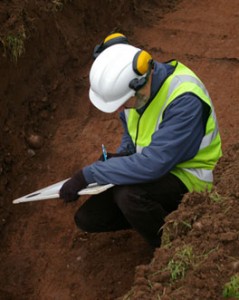 I began my working life in the mid-1970s, starting out in civil engineering, working on highway design. After four years doing a mixture of tasks including technical draftsman, site surveyor and day release to attend college, I decided that this wasn’t for me. Somewhere, probably a Sunday newspaper, I read about archaeology and thought it sounded fantastic. In the summers of 1976 and 1977 I spent my holidays on excavations and decided that this was what I wanted to do. In June 1978 I took my last civil engineering exams and in August resigned my job. The next few years were spent in a mixture of college and university (four years) and living in tents (two years) and on the floors of substantially empty houses with varying numbers of other semi-itinerant archaeologists.
I began my working life in the mid-1970s, starting out in civil engineering, working on highway design. After four years doing a mixture of tasks including technical draftsman, site surveyor and day release to attend college, I decided that this wasn’t for me. Somewhere, probably a Sunday newspaper, I read about archaeology and thought it sounded fantastic. In the summers of 1976 and 1977 I spent my holidays on excavations and decided that this was what I wanted to do. In June 1978 I took my last civil engineering exams and in August resigned my job. The next few years were spent in a mixture of college and university (four years) and living in tents (two years) and on the floors of substantially empty houses with varying numbers of other semi-itinerant archaeologists.
My first ‘proper’ archaeological job was with Bedfordshire County Council in 1989 where I was employed to complete a project recording the county’s historic bridges. I left this post early in 1992 to join Worcestershire County Council’s Archaeology Service, where I stayed for 6 years. I left Worcestershire County Council in 1998 to set up my own archaeological practice which I intended would specialise in the smaller size of archaeological project. Until the early 1990s the archaeological world was dominated by county or university-based operations which employed considerable numbers of archaeologists. It was my belief that there was room in the market for a number of small scale archaeological practices, with low overheads, who could undertake these smaller projects more cheaply. With my tenth anniversary now behind me I feel that I was justified.
How I keep costs down
It became apparent to me in the early 2000s that my archaeological income couldn’t support even my modest lifestyle. Making a virtue out of a necessity, I decided to go where my competitors couldn’t follow. In 2003 I commissioned a narrow boat and during the following year had it fitted out for me to live on board. The consequence of this is that I have no mortgage, mains electricity, gas or water, nor the bills that go with them. It is also the reason that I have only a mobile telephone. My electricity is based around a 12 volt system whose batteries are charged, substantially, by solar panels on the roof of the boat. Heat during the winter is provided by a small, solid fuel stove which, most of the time, burns wood which costs me nothing, except the labour of cutting and chopping it. I use two 13kg cylinders of propane gas each year for the cooker. The boat has a 140 gallon water tank which I refill periodically from canal-side water points, provided for the purpose. I have a small hatchback car which does around 42 mpg in mixed driving conditions.

Occasionally, it has been possible for me to take my boat to the project. I was able to save a client a considerable sum of money on an extended canal-side project in Brownhills by mooring alongside the site and living there for three months. Travelling costs were zero and, in the event that I wasn’t needed on a particular day, I just did something else. As the price of fossil fuels and energy rises and as the country’s financial situation worsens (summer 2008) I feel that I am well-placed to continue to provide an economical service.